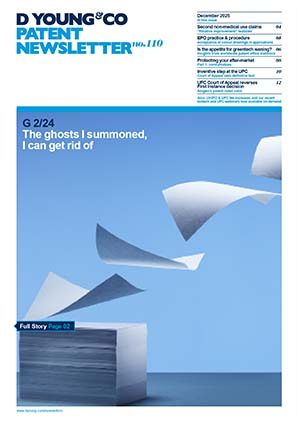EPO calls time on pilot project for ViCo opposition proceedings
Following publication of the final report on the pilot project for oral proceedings in opposition by videoconference (ViCo), the President of the European Patent Office (EPO) has decided all opposition oral proceedings are to be held by ViCo, by default, from 01 January 2023.
Introduction
The Covid-19 pandemic provided the catalyst for many changes to the EPO’s IT systems and working practices. Although oral proceedings by ViCo were allowed in examination proceedings before the pandemic this was at the discretion of the Examining Division, and it was only in April 2020 that oral proceedings by ViCo became the default position in examination proceedings.
Due to the additional complexities oral proceedings present in opposition proceedings (such as there being multiple parties, the frequent need for real-time interpretation, and the proceedings being public), opposition oral proceedings were exclusively held face-to-face prior to the pandemic. The pilot project was therefore launched in April 2020 as an attempt to maintain business continuity during the pandemic. Although initially planned to run for one year, the pilot was extended four times, and will now finish on 31 December 2022.
During the project over 6,000 oral proceedings in opposition were held by ViCo, including 34 oral proceedings on the same day, a feat that would have been impossible with face-to-face oral proceedings at the EPO.
Experience and feedback
The final report presented the results of a user satisfaction survey conducted in autumn 2022, which found that overall satisfaction with opposition oral proceedings by ViCo continues to improve, with 77% of respondents reporting favourable experiences of oral proceedings: up from 66% in a similar survey in 2021.
There was a perception at the beginning of the pilot project that oral proceedings by ViCo would affect the outcome of the proceedings. Indeed, following the start of the pilot project there was an increase in the number of patents being revoked (and conversely a reduction in the number of patents being maintained in amended form). However, this variance in outcome, compared to before the start of the pilot project, disappeared in January 2021, following the removal of the requirement for all parties to consent to oral proceedings being held by ViCo. This also resulted in a significant reduction in the number of requests for postponement of oral proceedings. It is likely that requests for postponement were used tactically at the beginning of the pilot project, for example opponents only consenting to oral proceedings by ViCo where they believed the chance of revocation was high, thereby increasing the number of opposition proceedings ending in revocation. The distribution of outcomes returning to pre-pandemic trends confirms that oral proceedings by ViCo has no bias or impact on the outcome of proceedings.
There was also a perception at the beginning of the pilot project that oral proceedings by ViCo would increase the length of the oral proceedings. In reality, 49% of survey respondents reported that oral proceedings by ViCo were a similar length to face-to-face oral proceedings, and 34% reported that oral proceedings by ViCo were shorter, although a true comparison is difficult due to individual factors for each opposition.
Another advantage of oral proceedings by ViCo is the removal of travel requirements for multiple parties to attend face-to-face proceedings at the EPO. The EPO conservatively estimates that the pilot project saved 1,000 tonnes of CO2 in 2021: the equivalent of the annual electricity emissions of 300 households. The removal of travel requirements has also improved accessibility for members of the public, and resulted in a 24-fold increase in the number of requests from members of the public to attend oral proceedings. This provides an opportunity for trainee attorneys and foreign associates to gain valuable insight into oral proceedings and procedures at the EPO.
Technological advancements
Following a similar user experience survey in November 2021 the EPO has taken steps to mitigate against the main disadvantages users reported from holding oral proceedings by ViCo. These included improving the quality of video feeds, and introducing the ability to pin several specific video feeds within the display window, to allow users to focus on the body language and facial expressions of particular participants.
The EPO also introduced digital whiteboards, screen-sharing and chat functionalities, to allow participants to share annotations, presentations, documents, and written exchanges, to support or clarify their arguments. This provides more media for presenting arguments than available at face-to-face proceedings, with the digital whiteboard functionality alone exceeding the functionality of the paper flip charts available at face-to-face proceedings.
Although 57% of respondents in the 2022 user satisfaction survey rated recent oral proceedings by ViCo better than earlier in the pilot project, only 37% of respondents said the technological advancements provided by the EPO contributed to this. The main factor in the apparent improvement in oral proceedings by ViCo was the users’ own increased experience with the format, demonstrating that familiarity with the format is important in order to get the most from oral proceedings by ViCo.
D Young & Co patent attorneys have extensive experience of using ViCo for both examination and opposition oral proceedings, having been participants in the initial ViCo feasibility trial conducted by the EPO in 2018. During the pilot project nearly 300 oral proceedings were scheduled in opposition proceedings involving D Young & Co attorneys.
Evolving legal and procedural framework
In the decision G1/21, in July 2021, the Enlarged Board of Appeal held that oral proceedings by ViCo are legally equivalent to oral proceedings held face-to-face under Article 116 EPC, and that oral proceedings by ViCo, although considered “sub-optimal” by the Enlarged Board of Appeal, comply with the principles of fairness of proceedings and the right to be heard.
Although face-to-face proceedings will be permitted where oral proceedings by ViCo are deemed inappropriate, this will only be in very limited circumstances, such as a party to proceedings having visual impairment that prevents them following oral proceedings on-screen, or where demonstration or inspection of an object with essential haptic features is required.
Recent Board of Appeal decisions following G1/21 have held that the following are not sufficient reasons for making oral proceedings by ViCo inappropriate:
- A high number of documents and/or experimental data in the proceedings.
- A high number of parties to proceedings.
- An anticipation that the proceedings will have a long duration.
Following a peak in December 2020, the number of objections to oral proceedings by ViCo has steadily fallen, indicative of a change in attitude of users to oral proceedings by ViCo, and users’ increased acceptance of the format.
Having previously peaked at 6,523, at the end of 2020, the number of pending oppositions is also back to pre-pandemic levels of just under 5,000, thanks in part to ViCo enabling a higher throughput of oral proceedings. The EPO announced its intent to maintain the number of pending oppositions below 5,000. The timeliness for resolution of oppositions has also gradually improved during the pilot project, with the EPO now aiming to resolve 70% of oppositions within 18 months, by the end of 2023. No indication, however, has been provided as to how close the EPO is to achieving this target.
Conclusions
In line with the final report’s conclusions, the President of the EPO decided not only that the pilot project is to end, but also that oral proceedings in opposition are to be held by ViCo by default from 01 January 2023. This will bring opposition oral proceedings in line with other first instance proceedings.
Although the President’s decision goes against the decision G1/21, which stated that face-to-face oral proceedings are “the gold standard”, G1/21 was explicitly limited to oral proceedings before the Boards of Appeal, and the Enlarged Board of Appeal did acknowledge that Article 116 EPC does not limit the form of oral proceedings. Equally, the President’s decision does not extend to oral proceedings before the Boards of Appeal, which are governed separately by the Rules of Procedure of the Boards of Appeal.
From the data presented in the final report, resistance to the President’s decision will be much lower than earlier in the pilot project, and many will welcome the decision. Indeed, D Young & Co continues to be well placed to represent clients in oral proceedings at the EPO.
Useful link
EPO oral proceedings in opposition by videoconference, pilot project final report, November 2022: https://dycip.com/op-vico-nov22


